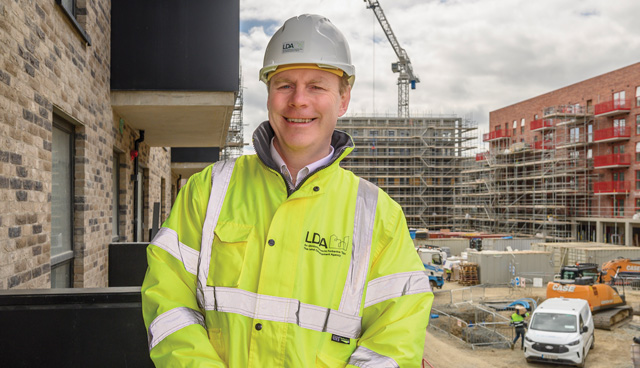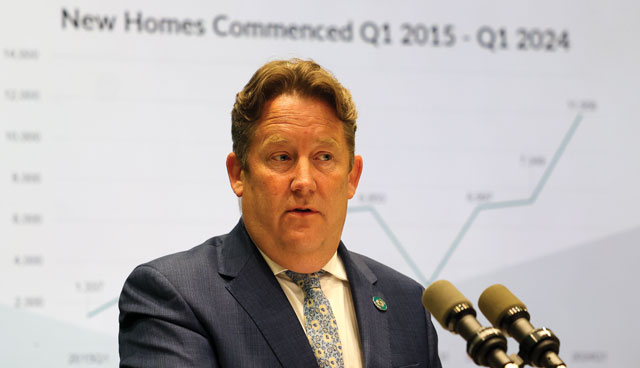
A European housing policy perspective
4th July 2024
Driving future skills in sustainable construction
4th July 2024Sinn Féin housing spokesperson Eoin Ó Broin TD: ‘We could achieve a hell of a lot’

Surrounded by a dozen piles of housing policy documents, Sinn Féin housing spokesperson, Eoin Ó Broin TD sits down with Ciarán Galway to outline his critique of government policy and articulate the alternative.
Reflecting on the fact that Sinn Féin President Mary Lou McDonald TD has repeatedly said that “housing will be the party’s number one priority” for 2024, and emphasising the significance of that, Ó Broin begins with a critique of government policy.
“One of the big problems we have at the minute is the Government’s social and affordable housing targets are too low and they are not being met, but also, too much of the stock that they are delivering, particularly on the cost rental and affordable purchase side, is too expensive,” he summarises succinctly.
Alternative plan
Consistently in the Dáil and in the media, however, Sinn Féin has been challenged to publish its alternative housing plan.
Indeed, speaking with the Housing Ireland Magazine Housing Minister Darragh O’Brien TD observed: “He [Eoin Ó Broin] told the Sunday Independent 16 months ago that he was just about to publish it and he has not.”
Addressing the absence of his party’s plan from the public sphere as yet, and the related criticism that this attracts, the Teachta Ó Broin is unperturbed.
“I like to remind people that [Minister] Darragh O’Brien had no housing policy when he was an opposition – not a single piece of paper – and it took him a full year as Minister for Housing before he launched his plan,” he retorts.
Sinn Féin’s alternative housing plan, he maintains, will be published “well in advance of the general election”, and possibly as early as summer 2024. Its targets for unit delivery, allied to affordability would be “fundamentally transformative”, he adds.
“We were holding off until we got The Housing Commission’s report and some other information from government that is important. If we are going to map out a five-year plan, we want it to be fully costed; something which even the Government’s own housing plan is not.”
Policy distinction
Rejecting the narrative that the distinction between government housing policy and Sinn Féin housing policy can be distilled down to a difference in emphasis between home ownership versus social and affordable housing, Ó Broin argues that “the number of new homes that are coming to market for people to buy each year has flatlined”.
“Last year [2023], approximately 8,900 new-build homes went on the market for people to buy, compared with about 8,800 in 2019. That figure has not moved; it dipped a bit over Covid and went up a bit in 2022.
“Even though the overall increase in supply has been tracked from 2019 to now, the number of those homes that are for people to buy is falling dramatically. It has gone from around 50 per cent of all new homes to less than 20 per cent.”
While Housing for All aims to deliver an average of 11,800 new homes for owner occupiers, and 6,500 for private renters, in 2023 it delivered approximately 8,500 for each. This, he argues, is a consequence of an increasing number of new builds being purchased by build-to-rent institutional investors.
“The private rented sector is playing far too big a role,” he insists. “In fact, it is outpacing the owner occupier sector, and it is exceeding its targets while the owner occupier sector is missing its targets.
“Homeownership is continuing to decline in real terms, as well as in percentage terms and what a Sinn Féin government wants to do is reset the balance away from institutional investors in the build-to-rent private rental sector in favour of regular folks buying homes in the private market, buying genuinely affordable homes from local authorities and approved housing bodies, and also getting access to affordable rent and social rent”.
While acknowledging that “we need a private rented sector”, Ó Broin believes that it needs to shrink as a proportion of the overall housing market. “Our private rental sector has grown too large, too dramatic, too insecure, and it is increasingly unaffordable. It needs to be professional; it needs to be secure; and its prices need to be moderated.”
Pointing to “more fundamental changes” and suggesting that he does not know “where government wants the housing system to be.”
“Darragh O’Brien had no housing policy when he was an opposition – not a single piece of paper – and it took him a full year as Minister for Housing before he launched his plan.”
Sinn Féin housing spokesperson, Eoin Ó Broin TD
“Our vision of where we want the housing system to be after five or 10 years – will be different. Similarly, the policies we are going to introduce right across the spectrum will be fundamentally different from what this government or its predecessors have done.”
Housing for All
When asked what elements of the Government’s housing plan – Housing for All – if any, that a Sinn Féin government would retain, his response is emphatic: “At the end of a five-year term of office – if Sinn Féin gets into government – there will be very little that will resemble what is there in the system now.”
While acknowledging that elements of policy, such as cost rental tenure and affordable purchase, are “good in principle”, he feels that “the Government has mangled them beyond belief”.
“We are going to revert back to the original ideas. This government did not invent cost rental, for instance. In fact, cost rental existed in the 1920s and the National Economic and Social Council (NESC) has been arguing in favour of it for the last 20 years,” he says.
‘Bad’ housing schemes
Outlining his ambition to “get rid of a lot of the bad schemes”, the Sinn Féin frontbencher references a Department of Public Expenditure, NDP Delivery and Reform (DPENDR) briefing from mid-May 2024 – Key Considerations for Future Delivery Landscape. In the briefing, DPENDR recognises the “strong momentum in overall housing delivery” but notes that government is “still not achieving social/affordable targets with demand outpacing delivery”.
In the context of ramping up delivery to “circa 50,000 units per year”, and supporting housing activation in the long term, the document lists five policy levers. The first of these suggests “divesting capital way from upfront untargeted subsidies and toward infrastructure investment to enable housing”. The ‘untargeted subsides’ referenced include the First Home Scheme and Help to Buy.
Help to Buy
Asked if Sinn Féin would bring an end to Help to Buy, Ó Broin responds assertively. “Absolutely. We have made it very clear we want to end Help to Buy and replace it with large volumes of publicly provided homes for people to purchase at prices between €250,000 and €300,000.
“Half the money that is spent on Help to Buy goes to people who do not need it. That is [supported by] independent research from the Oireachtas’ Parliamentary Budget Office and from Mazars [on behalf of the Department of Finance]. One-third of the people who receive it do not need it – they already have a sufficient deposit and a mortgage to purchase,” he says.
While conceding that the balance of people are feeling the benefit of Help to Buy, he insists that the scheme is artificially inflating house prices meaning that “lots of other people are locked out of the market”. Articulating this point to the electorate, however, may prove challenging ahead of the general election.
Faced with the reality that political opponents will portray his party’s proposals as having the potential to undermine first-time buyers, as well as demonstrating the party’s alleged ideological opposition to homeownership, he confirms that he would seek to replace the scheme rather than simply abolish it.
“We would replace it, in the first instance, with a really ambitious affordable purchase programme through local authorities and approved housing bodies, alongside other measures on the private sector side to activate more private sector supply, but at more moderate prices,” he comments.
Social housing
Turning to social housing delivery, Ó Broin highlights that overall social housing need is increasing “because the number of new social homes that have been produced each year is about the same as the number of new households coming on to social housing waiting lists each year”.
Indeed, in March 2024, The Housing Agency published the 2023 Summary of Social Housing Assessments (SSHA) which revealed that a total of 58,824 households were assessed as qualifying for social housing supports on 1 November 2023 but were not having their needs met. This represents an annual increase of 1 per cent (982 households) following an increase to baseline social housing income thresholds by €5,000 for all local authorities.
“The problem is that government only counts part of the need; the local authority lists. It should also count HAP and RAS tenants. Government estimates that we need about 50,000 to 60,000 new social homes. The actual real level of need when you include HAP and RAS tenants, is close to 140,000.
“So, the Government is producing only about half the number of homes that are needed to start reducing existing need and to meet the new need that is coming in. They keep making this stupid statement saying: ‘It is highest level of social housing since the 1970s.’ That is true, but the population has doubled, and the level of need has increased.
“If government wanted to actually meet social housing need in the way we did in the 1970s – when, in some places, we had a surplus – it would have to double the output [of social housing delivery],” he says.
Affordable leasehold purchase
Having identified the challenge, Ó Broin then articulates his solution. While acknowledging the role of housing benefit as a short-term necessity, he calls for a “controlled unwinding” of the reliance on rental subsidies as a form of long-term support via the introduction of affordable leasehold purchase.
“With respect to tenant purchase, tenant purchase has real value. The problem is when the properties are sold into the rental sector or the private for-profit market. We have long argued that we will continue tenant purchase, but we will not sell the land.
“Instead, we will give you free, indefinite use of the land through a legally binding covenant for you, your children, and your grandchildren. However, if you want to sell, you will have to sell back to the local authority at the discounted price, index-linked for inflation.
“That way you get the benefit of tenant purchase – an income mix within working class communities and intergenerational security of tenure – which are really valuable things, while never losing the stock to the private sector.”
Critique
The proposed affordable leasehold purchase scheme is a lightning rod for criticism. Speaking with the Housing Ireland Magazine, Minister for Housing Darragh O’Brien TD referenced the proposal as “a Cuban style model of housing that they want to bring in”.
Responding to a suggestion that his political rivals could portray the scheme in a manner that implies that people will not own their own homes, Ó Broin is undeterred. “The interesting thing, of course, is that under the Government’s Help to Buy scheme, you do not own your home because they own €100,000 worth of equity in it.
“I have conversations with people all around the country about this. The overwhelming majority of people want to buy a home for them, their children, and their grandchildren, at a price they can afford. They are not, in the first instance, buying it and thinking of the windfall gains in 20 years.
“Within five years we could achieve a hell of a lot…”
“Our scheme allows them to do it; they own the home. The bricks and mortar are theirs, but the land is the State’s, as is the cost of site servicing. Whether you buy an affordable home or you acquire your tenant purchase home, that property is yours and you have all the same rights as any other owner. The only difference is that the State owns the land.”
Developer perspective
In May 2024, comments made by major developers at a property, infrastructure and investment conference suggested that a radical new direction for housing policy taken by any new government would create uncertainty and slow down the sector.
Agreeing that “industry is entitled to its view”, the Sinn Féin housing spokesperson observes that “one of the most successful residential developers in the country – Michael O’Flynn – is calling for a radical reset”.
This is a reference to O’Flynn’s – the Chairman and CEO of the O’Flynn Group and a member of The Housing Commission – interview with RTÉ Radio 1’s Today with Claire Byrne, during which he said: “The vast majority of what we [The Housing Commission] are proposing here needs to be looked at and acted upon urgently. This is not a case of more of the same, this is a case of we need to make changes and we need to make them now.”
Expanding on this point, Ó Broin references his own engagements “with very large PLCs, the large private operators, or the SMEs”, most of whom he says, “are telling me that the current system is not working”.
“If we want half of all new homes to be public – social, affordable rental, and affordable purchase – that means the other half have to be private. That means private finance, private developers, private builders, and private land have to deliver those private homes – though far more owner-occupier than rental.
“The big failing of government is they have put all of their eggs in the demand side basket, and it has just been incredibly inflationary. It fuelled the wrong kind of investment capital, to operate in a much more speculative manner, which pushes up all-in development costs.
“We want to shift the focus completely away from the demand side subsidies, and towards what I call risk reduction, cost reduction, and activation measures, at the early stages of development, particularly around those sites that could deliver really high density.”
Report of The Housing Commission
Providing his analysis of the Report of The Housing Commission, Ó Broin summarises that “very clearly, it is making some very radical propositions in terms of how to fix the things that are not working”.
“Some of the headline stuff is really important, the very fact that they have named the deficit [of unmet demand] and put a number to the deficit is really important,” he remarks.
The Housing Commission estimates that, at the time of Census 2022, the housing deficit within the State was between 212,500 and 256,000 homes.
Ó Broin also highlights the report’s recommendation that the size of the social and cost-rental housing sectors be increased to 20 per cent of total housing stock. “Getting to 20 per cent of all housing stock means that we need 50,000 – if not 60,000 – new homes each year. Half of those need to be social, affordable rental, and affordable purchase. That gives you a sense of the scale of the challenge The Housing Commission is laying down; not just the total number, but within that the social and affordable.”
On the proposed establishment of a Housing Delivery Oversight Executive, he expresses surprise at the Housing Minister’s initial opposition to the proposal. “I think he misunderstands what they are proposing; they are not proposing a new level of bureaucracy. We have a real issue, which is that different state agencies and the private sector have different capital programmes that are not aligned to Uisce Éireann, Gas Networks Ireland, ESB Networks, our local authorities, our approved housing bodies, and the private sector developers.
“If I understand the proposition right, it is more about a statutory mechanism to bring those different groups together, to align their medium- to long-term capital programmes and to remove obstacles in the short term. Certainly, that is something worth considering.”
Consistency
Asked how he squares the comments made by chair of The Housing Commission, John O’Connor, that the “most important thing now is consistency”, with the Commission’s call for a “radical strategic reset of housing policy”, Ó Broin interprets O’Connor’s comments as highlighting “the fact that there has been very little consistency over the lifetime of this government or before”.
“Arguing for consistency does not mean they are arguing against change. They are arguing for very profound change. But once you make the change, you stick with the changes that you are implementing.”
Institutional investors
In the context of The Housing Commission’s suggestion that a significant increase in the annual housing delivery target would require a “substantially higher” investment, senior government figures have argued that Ireland must become a “welcoming home” for international institutional investors.
Simultaneously, the Commission asserts that as “a consequence of [housing] policy failures… Ireland has, by comparison with our European partners, one of the highest levels of public expenditure for housing, yet one of the poorest outcomes”.
Asked about the role that international institutional investors can play in this context, Ó Broin dismisses what he regards as a false dichotomy. “The Government will try to say that it is for homeownership and that we [Sinn Féin] are for social homes, or that they are for private investment, and we are against it. Neither is accurate because we have been arguing all along that it is about the right kind of private sector investment.”
“I talk to a lot of investment folks. [Sinn Féin finance spokesperson] Pearse Doherty TD does the same. All they want to know is ‘what is the plan’? When they hear us saying that in addition to prioritising the largest public housing programme in the history of the State, we want to create a stable environment for long-term, low-yield investment in the private sector to deliver that other 50 per cent, the proposition then becomes attractive to them. After that, it becomes about the question of the what, the why, and the where.”
One term in government
In an interview with eolas Magazine in late 2023, Sinn Féin’s Matt Carthy TD suggested: “Some of the challenges are so big… that, of course, it will take more than a five-year term in government. I also think, to be quite frank about it, if we do not solve housing in one term of government, we will not get a second.”
Asked if he agreed with his colleague’s assessment and whether it was realistic that a challenge such as the housing crisis could be solved in a single term of government, Ó Broin insists that his party “must be very upfront with people” across all the portfolios.
“We have to set out very clearly to people what is deliverable year-on-year, what is deliverable over a full term, and what we would seek to deliver if we got a second term,” he says.
In housing specifically, he details his projected timelines for Sinn Féin’s alternative plan to take effect. “Within six months we could start to get the homelessness numbers down. We could start ramping up the delivery of social and affordable homes very significantly by year two, and then exponentially by years four and five.
“Very significant reform of the Residential Tenancies Act 2004 and changes to rent regulation could be done immediately, so that people would see our intentions.
“Within five years we could achieve a hell of a lot that would set us up to go back to the public and say: ‘Look at what we have done over the last five years, let us finish the job’,” he concludes.







